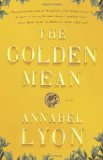Summary | Excerpt | Reading Guide | Reviews | Beyond the Book | Read-Alikes | Genres & Themes | Author Bio

Critics' Opinion:
Readers' Opinion:
First Published:
Sep 2010, 304 pages
Paperback:
Sep 2011, 304 pages
 Book Reviewed by:
Book Reviewed by:
BookBrowse Review Team
Buy This Book
This article relates to The Golden Mean
Alexander III of Macedon (356–323 BC), popularly known as Alexander the Great, was one of history's most successful military commanders. He is reputed to have never lost a battle, and his tactics are still studied in military academies. He successfully challenged the Persian Empire, the largest, most powerful kingdom of the time, and conquered its vast territory after a series of battles and the death of the emperor, Darius III. By the time he died at the age of 32, Alexander had seized an immense amount of land stretching from Greece and the Balkans to parts of India and Afghanistan, as well as Egypt (map).
Alexander's most enduring legacy, however, lies in spreading Greek culture and civilization to the places he conquered. While his empire would collapse shortly after his death, Alexander ushered in what is known today as the Hellenic Age, where Greek (mainly Athenian) language, ideas, and people traveled to lands in the East formerly ruled by the Persian Empire. This export created a hybrid of Greek and Eastern cultures that much later resulted in the Byzantine Empire (the Eastern part of the Roman empire that survived after the fall of the Western Empire), and would endure for more than a thousand years. When the Byzantium capital Constantinople (Istanbul) fell to the Ottoman Empire in 1453, many Greek scholars and texts migrated to Northern Italy, particularly to Florence, fuelling the Western European cultural movement known as the Renaissance.
Alexander was not actually a Greek but a Macedonian (Macedon was located a few hundred miles from Athens, in the north of modern day Greece), which leads one to ask why Alexander's legacy lies in Greek culture and not Macedonian? The short answer is Aristotle.
Alexander's father, Philip II of Macedon, having conquered most of Greece either directly or through the threat of invasion, invited Greek tutors to Macedon to educate his son. From his teachers, including the philosopher Aristotle, Alexander gained a deep love and appreciation for Greek culture. He is said to have slept with Aristotle's annotated copy of Homer's epic poem The Iliad under his pillow even on his military campaigns, and to have compared himself to Achilles, one of Greece's greatest legendary heroes. He aspired to the Homeric ideals of glory and fame and, according to Plutarch's biography, once wept at hearing of one of his father's victories, saying he would never have any "great or brilliant achievement to be displayed to the world."
After conquering the Persian Empire, Alexander began blending Greek and Eastern cultures, wearing Persian outfits and using the Persian title "King of Kings," or Shahanshah. While this step worried his fellow Macedonians, who considered the Persian culture effeminate and worried he would lose his warrior edge, it endeared him to his new subjects, who were proud that their new ruler would adopt their customs. He also had many cities built in his name, most notably Alexandria in Egypt (Cleopatra, Egypt's last true Pharaoh, was the direct descendant of Alexander's general Ptolemy, founder of the Ptolemeic dynasty that ruled Egypt for 275 years until the Roman conquest of 30 BC).
Thus, in a sense, Aristotle bears responsibility for the spread of Greek culture, as he taught the young Alexander everything he knew of medicine, philosophy, morals, religion, logic and art. The irony is that Alexander, who would have been considered by many Greeks to be an uncivilized barbarian, was the one to transport these ideas throughout the rest of the known world, keeping the Greek civilization alive for many generations.
Filed under People, Eras & Events
![]() This "beyond the book article" relates to The Golden Mean. It originally ran in October 2010 and has been updated for the
September 2011 paperback edition.
Go to magazine.
This "beyond the book article" relates to The Golden Mean. It originally ran in October 2010 and has been updated for the
September 2011 paperback edition.
Go to magazine.





The House on Biscayne Bay
by Chanel Cleeton
As death stalks a gothic mansion in Miami, the lives of two women intertwine as the past and present collide.

The Flower Sisters
by Michelle Collins Anderson
From the new Fannie Flagg of the Ozarks, a richly-woven story of family, forgiveness, and reinvention.

The Funeral Cryer by Wenyan Lu
Debut novelist Wenyan Lu brings us this witty yet profound story about one woman's midlife reawakening in contemporary rural China.
Your guide toexceptional books
BookBrowse seeks out and recommends the best in contemporary fiction and nonfiction—books that not only engage and entertain but also deepen our understanding of ourselves and the world around us.